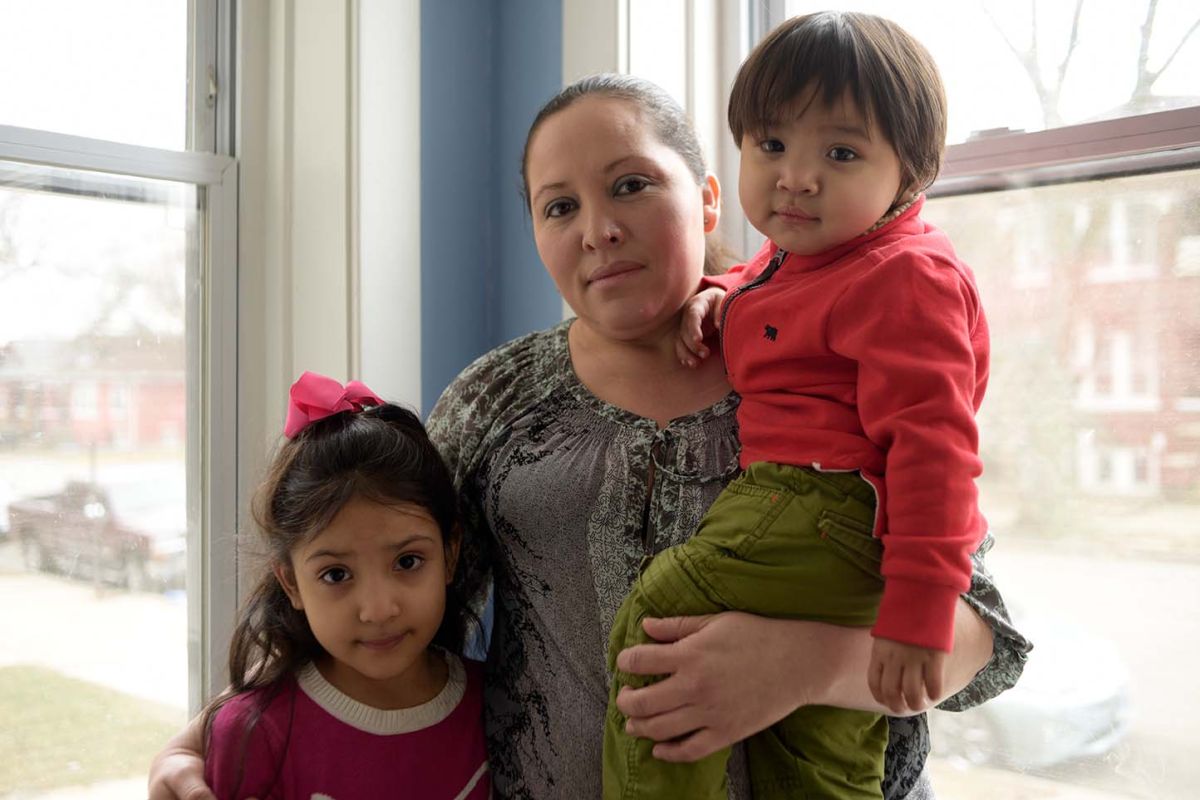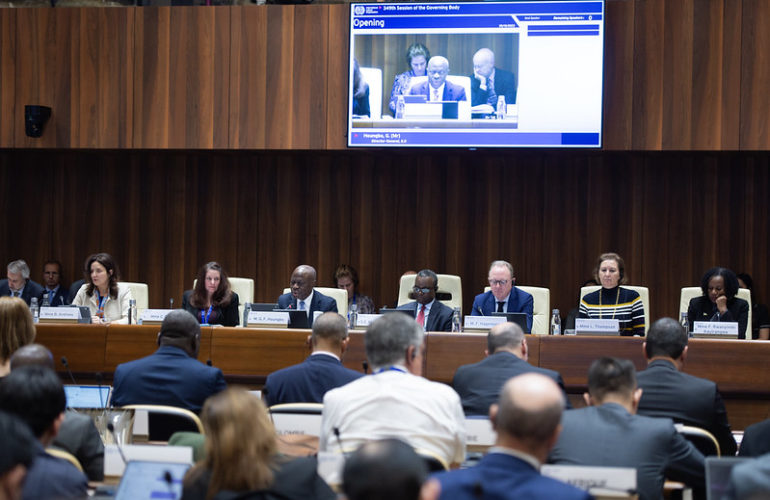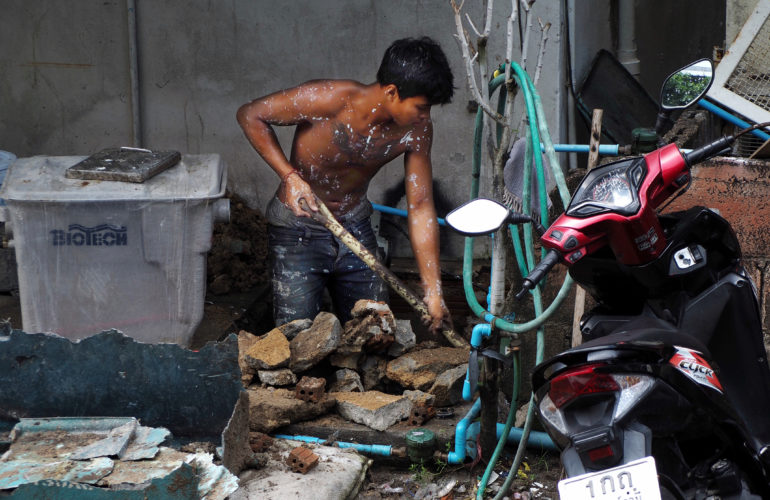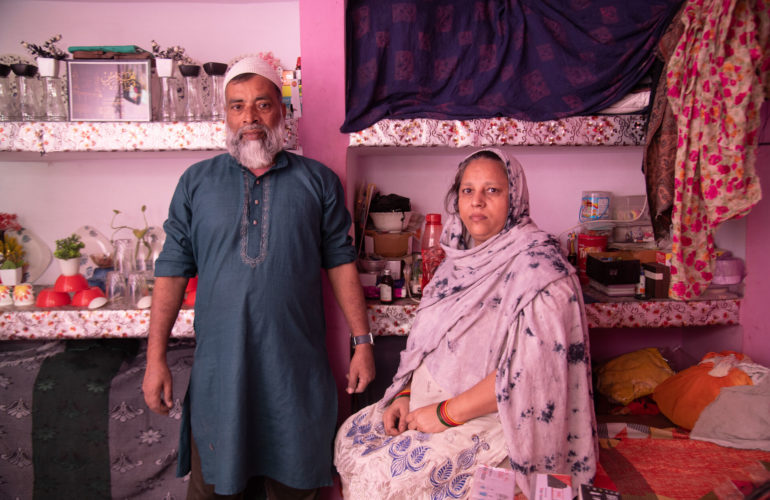“We Must Ensure Governments Remain True to Their Commitments Under the Global Compact for Migration”
ICMC Director of Policy Stéphane Jaquemet reflects on the first International Migration Review Forum, held in New York on 17-20 May 2022, and looks ahead to the next four years of implementation of the Global Compact for Migration.

By Rachel Westerby*
In December 2018, 152 States adopted the Global Compact for Safe, Orderly and Regular Migration (GCM), the first-ever global framework for international collaboration on topics of migration governance. The agreement aims to increase international collaboration on all aspects related to migration, including human rights, humanitarian needs, and development.
The GCM’s text states that the International Migration Review Forum (IMRF) will serve as the primary intergovernmental global platform to discuss and share progress on the implementation of all aspects of the GCM with all relevant stakeholders.
The IMRF is convened every four years, and each edition produces a Progress Declaration. Following the first IMRF in New York on 17-20 May, we spoke with the International Catholic Migration Commission (ICMC)’s Director of Policy Stéphane Jaquemet to hear his thoughts on the event and on the future implementation of the GCM.
**
ICMC Communications: Now that you have had a few days to reflect on the first IMRF, what is your overall assessment? Did it meet your expectations and those of civil society?
Stéphane Jaquemet: On the positive side, I witnessed the extent of civil society mobilization for the IMRF. All our partners were focused. As individual organizations, they provided inputs in areas related to their specific mandates, such as the detention of migrants, women’s rights, etc. Moreover, civil society actors were eager to exchange before making a statement, to ensure that we would cover every area of an issue and produce coordinated messages.
We felt that by being united we could create a critical mass that speaks to governments with one voice. This mix of private initiatives with specific mandates and coordination of our various interventions was very positive.
The same was true of our work with stakeholders beyond civil society. We worked with mayors and local authorities, the business community, youth, parliamentarians, and academics. There was a sense of common purpose, which showed governments that stakeholders are united and coordinated around the IMRF and, more broadly, around the implementation of the GCM.
Civil society had expressed some concerns about the content of the Progress Declaration during the drafting process. What is your assessment of the final declaration?
The Progress Declaration’s first draft was much more progressive than the final version. Comments and inputs from governments between drafts three and four, in particular, led to a weakening of language on several key points. I want to highlight the weakened language on detention, especially on the detention of children, and on regular pathways and regularization. I also want to point out the absence of any specific paragraphs on women’s rights. On the positive side, the Progress Declaration does mention systemic racism rather than simply referring to ‘discrimination,’ which is a step forward.
Overall, the Progress Declaration reaffirms the GCM, but governments’ commitment is not very strong. On the last day of the IMRF, after the Progress Declaration was adopted, some governments made final statements clarifying and limiting their endorsement, which is very worrisome. Some States basically said that they didn’t want to break the consensus on adopting the declaration, but that their actual positions on specific issues were different and lesser than the commitments the declaration sets out. They were reaffirming very strongly that the Progress Declaration and the GCM are not legally binding and do not create any legal obligations. Indirectly, they’re saying “we’ve signed it, but we don’t feel obliged to implement it fully”.
In your 16 May intervention at the Multi-Stakeholder preparatory meeting to the IMRF, you said the Progress Declaration is not the Global Compact, and vice versa. Do you believe it better to maintain a focus on the principles and commitments of the GCM and not get too hung up on the Progress Declaration?
Strictly speaking, the Progress Declaration cannot change the commitments made in the Global Compact. But it is indicative of how far governments are ready to go, and in that sense sets out exactly where governments see themselves four years from now. If governments are not absolutely convinced about some of the language of the GCM, it also means that they will not go further than what they have accepted for the Progress Declaration.
In any case, the Progress Declaration is by definition a compromise between the governments that are ready to go a bit further and those who are not prepared to go as far as the commitments it includes. For example, most of the Latin American countries, except Brazil, are rather on the progressive side, while some States like Denmark and the Netherlands, which are GCM signatories, would be happy not going as far as what’s included in the Progress Declaration. We need to be careful, because at the end of the day what’s important is what governments do at the national level, and this is where we see that some governments clearly do much more than others.
The express reference to GCM can also be perceived as politically problematic by some governments, mainly because it has been instrumentalized by the extreme right. Consequently, some governments may be working to improve migrants’ situation, but won’t reference to the GCM. In Europe, for instance, several governments have made no public reference to the GCM because they believe, wrongly in my opinion, that to do so would be disadvantageous in electoral terms. A government may have a regularization program, but it is ‘silent’ regularization in the sense that they would never publicly call it so, as public efforts to regularize migrants may enable the extreme right to start talking about how “the gates of Europe are wide open”.
Therefore, my statement emphasized that the GCM and migration governance are not the Progress Declaration, but are rather what governments do on a daily basis vis-à-vis migrants.
How far do you see this dynamic mirrored in the GFMD process, which of course has been around for much longer? Do the same kind of political tensions exist there, and do they affect States’ participation in the same way?
I think the GFMD went through a bit of a different crisis. The GFMD is not a UN process, unlike the GCM, but rather a “pure” intergovernmental process. In intergovernmental processes, how work progresses usually depends on how proactive the State that chairs the process is. The GFMD has always been dependent on a maximum of 15 to 20 very active countries.
Many governments engage in the GCM from within the same ministry as for the GFMD, with the same section within that ministry dealing with both processes. Governments don’t have the resources to recruit a team of ten staff just for the GCM or the GFMD. To some extent, the GFMD crisis was caused by existential questions about whether it was necessary to continue with the GFMD now that we were refocusing around the GCM. I disagree with this view because the GFMD is much easier to communicate about with a domestic audience. It is also a process, which is more open, where governments are ready to take calculated risks. Finally, it is a platform where civil society and the other stakeholders are full partners of governments, something we very much value. After some difficult months, the GFMD is now back on track with many governments recognizing its value added, compared to the GCM and IMRF. We are very much looking forward to the Franco-Senegalese chairmanship that will start next month.
In the lead-up to the IMRF the Civil Society Action Committee published an open letter to the UN General Assembly setting out concerns as to civil society participation. How do you view this aspect of the first IMRF now the program has concluded?
I think the letter did have some impact, in the sense that civil society was granted additional consultation meetings throughout the agenda.
However, obtaining U.S. visas remained a major issue for civil society participants. Each IMRF is held in New York, and visas are challenging to obtain. Average waiting times are very long, and visas are less likely to be granted to participants from specific countries of the global South. When the IMRF program kicked off, many key civil society participants, most often those working at the grassroots level in the global South, were yet to receive an answer on their visa application. To ensure civil society IMRF participants can obtain visas in a timely manner in future, we absolutely need both UN assistance with the visa process and embassies’ early involvement.
The UN Network on Migration put in place a scheme to provide financial assistance for civil society participants’ travel. But funding was confirmed very late, and people who could not buy tickets could often not have their visa applications processed in time. The key lesson for the future is to prepare these aspects far earlier, and to include guaranteed year-on-year financing for civil society participation in the IMRF process.
Do you think there’s any danger that civil society’s willingness to engage in the IMRF process will decrease if these types of participation issues persist?
I think it is good to acknowledge who was at this first IMRF; grassroots organizations and States that are not so committed to the GCM were there. This is positive.
Civil society is right to prioritize work at the national level, where migrant rights are affected, and where its interventions and efforts can produce practical change. But the international level puts pressure on States, however indirect, to be accountable for their actions and progress on migration and migration governance. We hope that governments will endorse the set of indicators that will be proposed by the UN Secretary General, as an objective way to measure progress in the implementation of the GCM. The UN Network on Migration has been established and is fully operational, and UN country teams are far more active in advocating on migration. All these steps are important to improve accountability at the international level.
A lot of preparatory work is happening outside of the IMRF meeting every four years. The next round of regional reviews starts in 2024, and civil society has a key role to play in ensuring that progress or stalemates are accurately reflected. Civil society absolutely cannot afford to withdraw from this process.
On indicators for GCM implementation, how will that work progress? Is that a key task for the GCM after this first IMRF?
The Progress Declaration references the development of a set of indicators within two years, so I expect that a first draft of indicators should be submitted to governments for discussion within the next six to 12 months.
The Progress Declaration also commits to improving data collection and sharing, which are needed to establish a baseline to measure progress. That would mean governments would have to go beyond stating what they have done. They will need to demonstrate how they have measured progress, and will be subject to the scrutiny of others, including civil society.
The first four years of GCM implementation were somewhat blighted by COVID. What are your hopes for GCM implementation in the next four years?
It’s a good question. When the GCM was adopted, no one was expecting COVID. COVID disrupted the implementation of the GCM, both for objective reasons and sometimes because it was used as an excuse by governments who had remained passive.
Governments could have done better. COVID is not an excuse for inaction, and COVID is definitely not an excuse for all the discrimination that we have seen against migrants. We saw some good practices here and there during the worst of the pandemic, concerning detention, suspending returns, ensuring access to services, and in some countries, non-discriminatory access to vaccines. But we also have seen many situations where migrants were detained without any kind of protection against COVID, where people were returned with COVID and infected other people back in their country of origin. We have seen some very bad practices.
Now we have the war in Ukraine, which, along with massive destructions and losses, is impacting the global economy in a major way. Prices are rising, which will probably have a long-term impact on employment. As soon as employment is affected, migrants feel that impact. It’s difficult to predict what’s going to happen.
As civil society, we need to be even more involved at the national and regional levels to ensure that governments respect their commitments. We need to make sure that there is a dialogue between civil society and governments on migration and migration governance in every country, whether it is directly related to GCM implementation or in countries that are not signatories. The lesson of the first four years is that if we are not proactive, we will continue to see governments backtracking from their commitments to the GCM. And that’s not something we can allow.
Finally, do you see a distinct role for faith-based organizations in implementing the GCM? What do faith-based organizations bring to civil society contribution?
In general, faith-based organizations are grassroots organizations. Even an international organization such as ICMC has a field presence, as do our members. We have daily programs providing healthcare, shelter, and education to migrants. In many countries, faith-based organizations are also the last resort for migrants in irregular situations.
Many members of our organizations are migrants, and having received support themselves, they also provide support to migrant communities with the proactive participation of those communities. People are guided by their faith with an ethos of non-discrimination, welcoming all regardless of faith, beliefs or nationality. For me, this is really something unique that faith-based organizations can inspire.
___
*The Global Compact for Safe, Orderly and Regular Migration is an international agreement adopted by 152 States in December 2018. As the first-ever global framework for migration governance, it aims to increase international collaboration on all aspects related to migration, including human rights, humanitarian needs, and development.
**The Global Forum on Migration and Development (GFMD) is a government-led initiative that brings together States, city mayors, business representatives, and civil society organizations concerned with migration and development issues. Its goal is to discuss sensitive topics, propose innovative solutions, and share policies and practices. The Global Compact for Migration’s text recognizes the Global Forum on Migration and Development (GFMD)’s role in its implementation. ICMC coordinates civil society activities in the GFMD.
___
Rachel Westerby is an independent writer and researcher on migration, refugees and integration.



